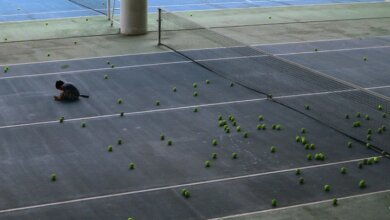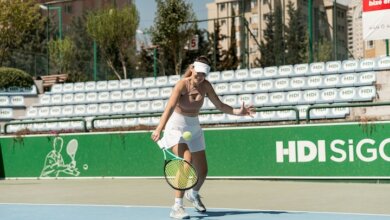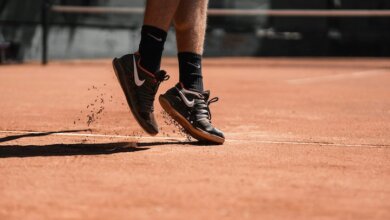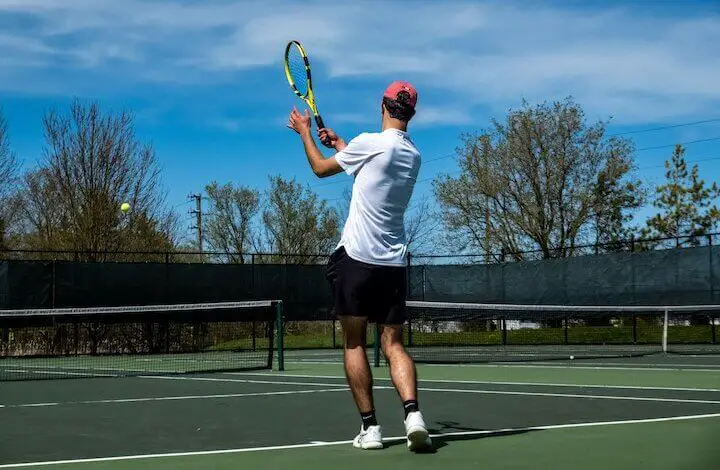
We're an affiliate
We hope you love the products we recommend! Just so you know, we may collect a share of sales or other compensation from the links on this page. Thank you if you use our links, we really appreciate it!
Ever found yourself zoning out or feeling drained halfway through a long match? Like, one moment you’re in the zone, and the next, your brain’s floating somewhere outside the court. If that sounds familiar, you’re not alone. Learning how to stay focused during long matches isn’t just about staying “locked in” the whole time. That’s not realistic. It’s about knowing how to come back—over and over—when your mind wanders, your body tires out, or the pressure builds.
And it doesn’t have to be complicated. You don’t need to be a pro or have years of experience. If you’re open to being honest with yourself, and you’re willing to practice a few simple habits, you can train your mind to show up and stay with you when it matters most.
So, let’s break it down together. No fluff, no performance talk—just the real stuff that’ll help you keep your focus during long matches.
Table of Contents
Key Takeaways
- Focus slips happen—but they don’t have to derail your match.
- Breathing, mini-routines, and body language can help you reset quickly.
- Using the score as a guide—not a panic button—keeps you in the present.
- Hydration and light fueling prevent energy crashes that kill focus.
- Staying kind to yourself when you drift helps you bounce back faster.
- Practicing focus outside of matches builds mental strength over time.
Why You Lose Focus in the First Place
Let’s get one thing out of the way: losing focus doesn’t mean you’re weak or unprepared. It’s just part of being human—especially in a sport like tennis that messes with your head as much as your body.
Here’s what usually pulls you out of focus:
- Overthinking the score – You’re in the middle of a point, but your brain is already thinking, “If I lose this one, it’s 4–1,” or “I’ve got to hold or I’m done.”
- Fatigue – When your legs feel like bricks, your brain gets sluggish too.
- Frustration – You missed an easy forehand, and suddenly all your thoughts are about what went wrong instead of what’s happening now.
- Over-planning – Thinking five steps ahead instead of focusing on the shot in front of you.
None of that is wrong. But if you don’t catch it early, it stacks up, and you’re not really playing anymore. You’re reacting. Drifting. Going through the motions.
The goal isn’t to avoid these moments. It’s to notice them fast—and reset before they pull you under.
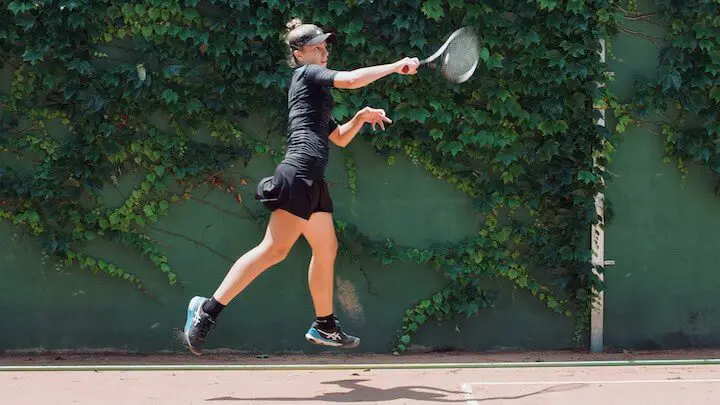
How to Stay Mentally Grounded Mid-Match
So what do you do when your head starts to drift mid-match?
Bring it back to your breath
When your thoughts scatter, your breath can bring them home. Don’t overthink it. Just take a deep breath—slow in through your nose, long out through your mouth. Do this between points. Even one breath can slow down the mental noise and bring you back.
Use towel breaks as mini resets
Wipe your face, take your time, and let that 15 seconds be about mentally clearing the board. Say to yourself, “Alright, new point.” Not “I have to win this,” just: “Here we go again.”
Anchor your eyes
Pick a spot—your strings, the baseline, your grip. Focus on it for two seconds between points. That tiny shift pulls your mind from chaos to presence. You’re not trying to win the match in your head. You’re just showing up for this point.
And that’s the heart of staying focused during long matches. You don’t conquer your mind once—you guide it back a hundred small times.
Check Out: How to Volley Like a Pro: Simple Steps That Actually Work
Create a Simple Between-Point Routine That Calms Your Mind
You don’t need something fancy. You need something repeatable.
Here’s an example that works well:
1. Walk to the baseline slowly.
2. Touch your strings.
3. Take one deep breath.
4. Say one calming word in your head like “reset” or “present.”
5. Step up and serve or return.
Simple, right?
The key is doing the same steps every time—win or lose the last point. That builds mental rhythm. And when the match gets tight, your body and mind know what to do without thinking.
You can tweak this and make it yours. But having some kind of rhythm you stick to? That’s gold when your brain starts to wobble.
Don’t Let the Score Hijack Your Focus
This is one of the hardest parts of staying focused during long matches. The scoreboard feels loud. Especially when you’re behind.
But here’s something I’ve learned: The score is just a snapshot. Not the full story.
You could be down 5–1 and come back. Or up 4–0 and lose the set. The match is always in motion. Your job is to focus on the point in front of you, not the story your mind is trying to write about what happens next.
Instead of thinking, “I can’t lose this point,” try this:
“Let me play this point with presence.”
You win matches by stacking one focused point on top of another. That’s it.
Eat, Drink, and Move Like Focus Depends on It (Because It Does)
Ever tried focusing with a dry mouth or heavy legs? It’s like trying to read with blurry glasses. It doesn’t work.
Hydrate before and during
Sip water or electrolytes during every changeover—even if you don’t feel thirsty. Dehydration messes with your brain before you feel it in your body.
Eat something light but lasting
If it’s a long match, snacks like bananas, energy bars, or dates can keep you from crashing. Low energy = low focus. Don’t wait until your legs give out to fix it.
Keep your body moving between points
Don’t slump. Don’t freeze. Bounce on your toes. Stay light. That movement keeps your mind alert too.
Your brain doesn’t run well on empty. Take care of it like you take care of your racquet.
Let Go of the Pressure to Stay Perfectly Focused
You’re going to drift sometimes. You’re going to get distracted. That doesn’t mean the match is over.
What matters is what you do next.
Instead of spiraling—“Ugh, I lost focus again”—try this instead:
“Okay. Come back.”
That’s it. No judgment. No over-analysis. Just come back.
This mindset keeps your energy steady. You stop wasting effort on self-blame, and you use it to stay present instead.
The best players aren’t perfectly focused. They just come back quicker. You can too.
Check Out: Tennis Dampeners vs No Dampeners: What Actually Matters?
Practice Focus Long Before Match Day
Here’s the thing nobody talks about: Focus is a habit. Not a magic switch.
The more you practice staying present off the court, the easier it becomes when things get tense mid-match.
Try this during your week:
- 5 minutes of breath focus daily – Sit down. Breathe. Notice your breath going in and out. When your mind wanders, gently come back. That’s the whole game.
- Visualize your between-point routine – Picture yourself stepping up, breathing, saying your word. It might sound silly. But it works.
- Reflect after each practice – Ask yourself: “When did I lose focus today? What helped me come back?”
These habits don’t just sharpen your tennis—they make you calmer, more centered, and more in control of your mind.

Conclusion
Long matches can wear you down—mentally, physically, emotionally. But now you’ve got something steadier than hype or motivation. You’ve got tools. Possess awareness. You’ve got habits that keep bringing you back.
So next time you’re deep in the third set, and your mind starts to wander or panic, you’ll know what to do.
Breathe. Reset. Play the point in front of you.
That’s how you stay focused during long matches.
And the more you do it, the more natural it becomes.
Frequently Asked Questions
How do I stop negative thoughts during long matches?
Try redirecting your focus to something physical—your breath, your strings, your routine. The key isn’t to fight the thoughts, but to bring your attention somewhere neutral.
What if I can’t focus no matter what I try?
Start smaller. Practice focus in short 5–10 minute drills. Build it like a muscle. Also check your hydration, sleep, and stress—those can all drain mental energy fast.
Does meditation really help with tennis focus?
Yes. Even just 5 minutes of daily breath focus can improve your ability to come back when distracted. It’s not about becoming a monk—it’s about learning how to gently return to the present.
How do I practice mental focus off the court?
Use simple habits like journaling, breath work, or visualizing tough match situations. Try reflecting after each practice: “Where did I lose focus? What helped me recover?”

